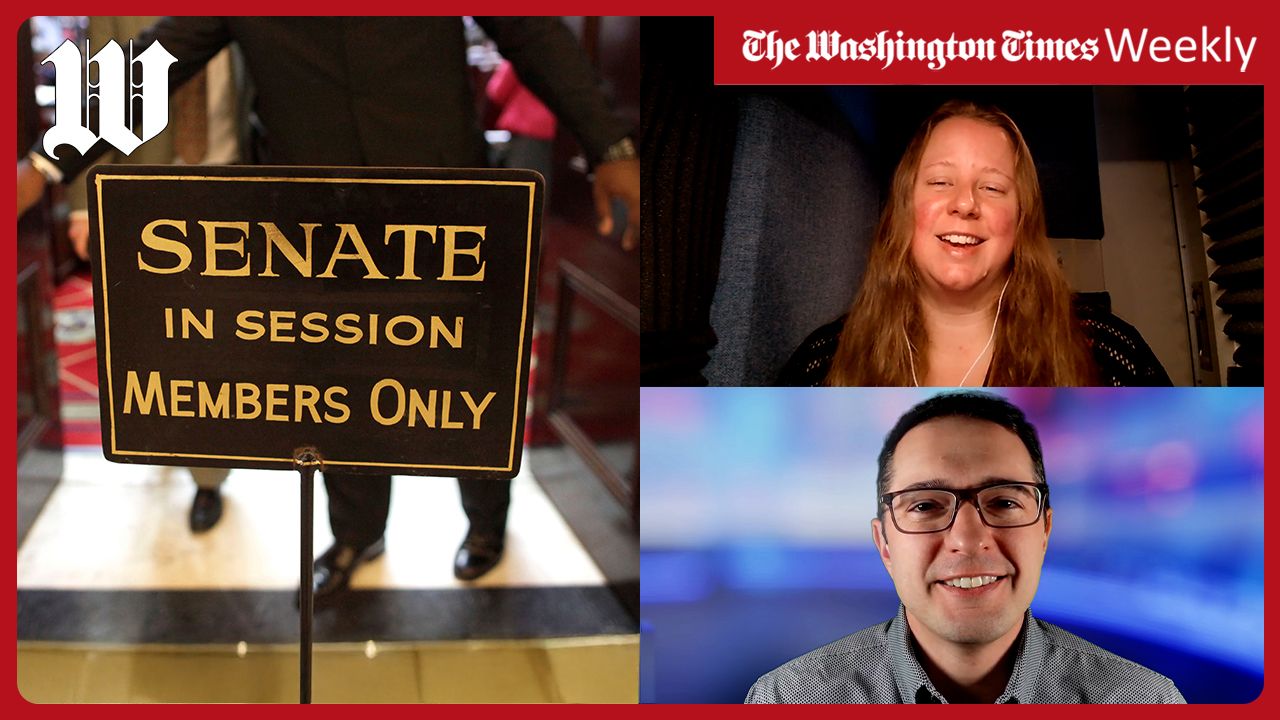
Hi, I’m George Gerbo. Thanks for joining us for this edition of Washington Times Weekly, where we get the chance to sit down with our reporters and talk about their latest coverage of news and events.
Joining me this week is Congressional Correspondent Lindsey McPherson.
[GERBO] Let’s start off with what’s going on in the Senate, specifically surrounding the release of files connected to the Jeffrey Epstein case. It’s been a big issue on Capitol Hill. It essentially forced the House to leave early.
And now in the Senate, it appears Democrats want to use a little-known and quasi-arcane law to force the release of those files.
[McPHERSON] There’s this oversight law. It’s called the Rule of Five that allows any five members of the Senate Homeland Security and Governmental Affairs Committee, which is the main oversight committee in the Senate, to request documents or records from an executive branch agency, and those agencies are forced to hand them over under the law.
Whether that happens in reality remains to be seen with the Epstein files in other cases as well. There have been efforts to use this law that have been rebuffed by administrations, but it is a law. So, it can go to court, and it can be litigated. And so Democrats are pretty insistent that if the Justice Department does not comply with their use of this law, that they will litigate it in court and try to force the release of the documents.
[GERBO] We’ll stay on the Senate side. There are over 150 nominees that President Trump has put forth that still need to be confirmed, and that’s something we’ll see happen over the course of presidential administrations, where the party in the minority will try to block some of these majority or presidential appointments from going through. And there’s a decent backlog of these, that’s happening in the Senate, but a little bit more, a little bit less than past predecessors that have held the Oval Office?
[McPHERSON] The backlog is different in that what is unique about this and unprecedented compared to past administrations is that Democrats have refused to confirm any nominees by voice vote or unanimous consent. Basically fast fast-tracking them, not wasting a bunch of floor time on people that have bipartisan support to be confirmed for their positions. So that’s the unique thing that none of them have been voice-voted or passed by unanimous consent in the Senate for Trump’s nominees this term.
In his first term, as of this time at the end of July, there were five by voice vote or unanimous consent compared to 46 for Joe Biden. And there are a lot more over, nearly 200 for Obama and a little over 200 for George W. Bush. So this is becoming a growing issue in the Senate and it’s definitely a problem Republicans are trying to overcome either by getting a deal with Democrats or potentially changing the rules to fast-track the nominees on their own.
Watch the video to see the full conversation


![Former Bravo Star Charged After Violent Assault Using a Rock-Filled Sock in Tennessee Walmart [WATCH]](https://www.right2024.com/wp-content/uploads/2025/07/Former-Bravo-Star-Charged-After-Violent-Assault-Using-a-Rock-Filled-350x250.jpg)




![Karoline Leavitt Levels CNN's Kaitlan Collins and Other Legacy Media Reporters [WATCH]](https://www.right2024.com/wp-content/uploads/2025/07/Karoline-Leavitt-Levels-CNNs-Kaitlan-Collins-and-Other-Legacy-Media-350x250.jpg)
![Man Arrested After Screaming at Senators During Big Beautiful Bill Debate [WATCH]](https://www.right2024.com/wp-content/uploads/2025/06/Man-Arrested-After-Screaming-at-Senators-During-Big-Beautiful-Bill-350x250.jpg)
![Illegal Alien Walked Free After Decapitating Woman, Abusing Corpse for Weeks [WATCH]](https://www.right2024.com/wp-content/uploads/2025/07/1753013138_Illegal-Alien-Walked-Free-After-Decapitating-Woman-Abusing-Corpse-for-350x250.jpg)







